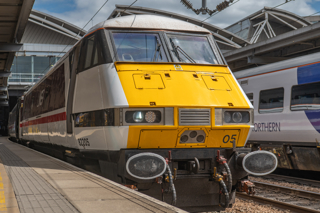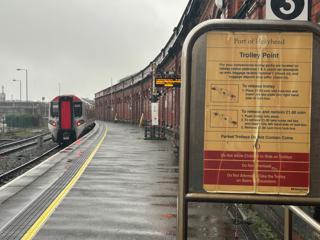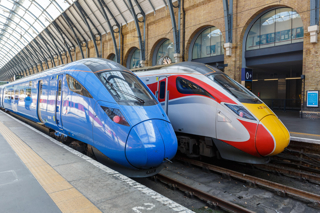The Department for Transport says that more than 500 brand new carriages, the removal of Pacers, and space for an extra 40,000 passengers at busiest times will provide a boost for the North, after it awarded two new franchises this morning (December 9).
Arriva Rail North Limited won the Northern franchise, while the TransPennine Express franchise has been won by First Trans Pennine Express Limited.
The franchises will be jointly managed from Leeds by the Department for Transport and Rail North Limited.
Secretary of State for Transport Patrick McLoughlin said: “We promised passengers a world-class rail service that would make the Northern Powerhouse a reality - and I’m delighted that we have found two operators that will deliver exactly that. As a one-nation government we are committed to closing the economic gap between north and south. This deal, and the joint management of the franchises, will bring the Northern Powerhouse to life.
“In 2004, the last time these contracts were awarded, the Government did not plan for growth. Today we’ve put that right.
“Arriva Rail North Limited and First Trans Pennine Express Limited went far beyond our requirements with exciting, ambitious plans that will make a real difference to customers, and - coupled with our commitment to push ahead with electrifying the vital trans-Pennine route - will help the region realise its full economic potential, ensuring it has a modern 21st century transport system. This is fantastic news for the North.”
Sir Richard Leese, chairman of the Association of Rail North Partner Authorities, said: “Passengers were clear that they wanted to see a transformation, including a lot more newer, better trains running more regularly with a step-change in services provided off-peak and on Sundays. They also wanted improvements to stations and changes to make ticketing easier - and thanks to all the partnership work by Rail North and the Department for Transport, that’s exactly what we are able to announce today.
“This is another crucial move towards devolution for the North. Rail North will now play a key role in the management and development of both new franchises, providing an excellent platform for further development and full devolution in the future. Rail North will work very closely with Transport for the North to drive forward economic growth by developing visionary proposals to deliver radically improved connectivity across the North.”
Arriva will operate the Northern franchise from April 2016 until March 2025. It will remove Pacers by the end of 2019, and £400 million will be spent on 281 new air-conditioned carriages, which is more than double the minimum required in the Government’s Invitation To Tender.
There will also be more than 2,000 extra services each week, with around 400 additional Sunday services, including: new direct journeys from Bradford to Wakefield, Sheffield, Nottingham, Liverpool and Hull; from Leeds to Chester and Bridlington; from Lincoln to Leeds; and from Manchester Airport to Warrington, Bradford and Halifax, nearly a 40% increase in capacity.
Space will be created for 31,000 extra passengers travelling into the five key commuter cities of the North (Liverpool, Manchester, Leeds, Sheffield and Newcastle) during the morning rush hour. There will be a new high-quality ‘Northern Connect’ service, meaning new or refurbished trains on longer-distance services, faster journeys and stations staffed daily, with catering services and free WiFi at each one.
As well as serving the five key commuter cities, this network will also serve other destinations including Bradford, Halifax, Blackburn, Accrington, Burnley, Lincoln, Worksop and Retford. There will be improved ticketing, including mobile and print-at-home tickets, and discounted fares for jobseekers.
First Trans Pennine Express Limited runs from April 2016 until March 2023. It will buy 220 brand new carriages capable of 125mph (the equivalent of 44 trains) in a £400m deal.
It will introduce new and additional services for Scotland - including a new, direct Liverpool to Glasgow service from December 2018 with new electric trains, extending existing services beyond Newcastle to Edinburgh from December 2019, and bringing in additional services from Manchester to Glasgow and Edinburgh from December 2017.
The new TPE deal will double the number of Manchester to Newcastle services and run more daily services to Hull from Manchester and Leeds (both from December 2017), bring in 9,000 extra seats into Manchester, Leeds, Sheffield, Liverpool and Newcastle (an overall capacity boost of nearly 70% across the region during the morning peak), and offer discounted advance fares for 16 to 18-year-olds and jobseekers.
Both operators will provide free WiFi - on TransPennine Express services and stations by July 2018, and on all Northern services and 36 stations by December 2019 - with media servers on trains providing entertainment and information to smartphones and tablets.
During the franchises, the Government and Network Rail will also forge ahead with electrification of the trans-Pennine line to deliver faster journey times and significantly more capacity. Network Rail is currently developing a detailed plan for the work, which (when finished) will provide a fully electrified route between Liverpool and Newcastle. The work is due to be completed in 2022.
The operators will also support the rollout of Oyster-style smart ticketing on public transport across the North, backed by £150m of government funding.
Government will receive £400m in premiums from First Trans Pennine Express Limited over the life of the franchise (previously, the franchise was subsidised by the Government). The amount of annual subsidy the government pays for the Northern franchise will be reduced by £140m by the end of the nine-year contract.
- For more on this story, read RAIL 790, on sale December 23.















P Hanson - 09/12/2015 20:34
Why don't the Goverment hand over the whole of the railway to the German State Railway as we are not allowed a national railway of our own. All these promises are pie in the sky aims.